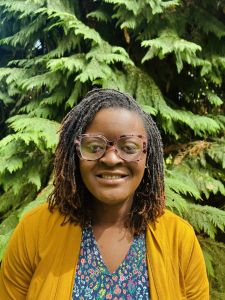
Ivy Fofie
Biography
Ivy is a PhD Candidate in the SOJC. Her research interests merge at the intersections of journalism, critical and cultural media, gender, race, ethnicity, class and sexuality. All her teaching and research centers these broad themes and interrogates the power relationship that exists within these various intersections. Specifically, her research explores ways to challenge existing social inequalities that have the potential of deepening oppressions of various marginalised groups. Before coming to the UO, she worked as an assistant professor at the University of Ghana teaching courses in journalism, public relations and gender studies. She is currently the editor of an online African women's magazine, written for and by women, called FemInStyle Africa (https://feminstyle.africa)
Her dissertation addresses a blind spot in feminist media history, political economy and media women’s relationships with gender and sexuality both historically and contemporaneously. Stemming from years of colonization and neocolonial interventions, women’s roles in nation building through media have been redefined and documented in stages. These documentations reveal parallel assumptions about women’s subordination, inferiority, and oppression in African societies. Yet national histories have been written from a male-centered, often elite perspectives. These accounts largely neglected women, mentioning them in relation to powerful male figures or on the sidelines of social, economic, and political events. This diminished version of women’s history has attracted the attention of feminist scholars who are working to retrieve women’s contributions. For instance, African feminists have importantly documented the fluidity of gender in pre-colonial African societies. This has helped establish the complementarity between genders that can help empower women, as well as help strengthen resistance to anti-LGBTQ movements. This approach has also yielded data on prominent women who were at the forefront of significant social and political events.
An area that has been unstudied thus far concerns the role of women who use(d) local language media to contribute to nation building and feminist activism. This research therefore queries the historical presence and roles of local language broadcast women in Ghana. It is an attempt both to understand the roles of local language women in broadcast culture and correct historical knowledge gaps. Pamela Creedon (1993, p. 4) notes that the re-visioning of women’s histories requires an act of looking back, of seeing with fresh eyes, and of entering an old text from a new critical direction. Parts of my study revisits the history of Ghana post-colonization and after the liberalization of the airwaves. It interrogates not only who said what and to whom in the media, but also how and why it was said in the way it was said in relation to gender and sexuality. This paves way to examine the content of current women-led programs in this space while also examining the political and economic media structures that enable this work.
Publications
Awino, I; Fofie, I.M. & Steeves H.L. (2023). “Gender and Digital Communication in Sub-Saharan Africa: A Feminist Political Economy of Enduring Inequities.” In P. J. Creedon & L.A. Wackwitz (Eds.) Women in Mass Communication: Diversity, Equity, and Inclusion. Routledge. Links to an external site.
Pusumane, O. & Fofie, I.M. (2022) “Bodies, Illicit mobilities and citizenry: The paradoxes of collective identities” in “Interdisciplinary Approaches to the Future of Africa and Policy Development.” Pp. 168-185 IGI Global.Links to an external site.
Yeboah-Banin, A.A., Fofie, I.M. & Muslim, S. (2021). Sexual harassment guide for media in Ghana, and Gender sensitive code for media organizations. Produced for Alliance for Women in Media Africa with funding from the US Embassy Small Grants Programme, Accra: UG Press. Links to an external site.
Yeboah-Banin, A.A; Fofie I.M. & Gadzekpo, A. (2020) Status of Women in the Ghanaian Media: Providing Evidence for Gender equality and Advocacy. Alliance for Women in Media Africa and University of Ghana School of Information and Communication Studies, Accra: UG Press. Links to an external site.
Links to an external site.ForthcomingF
Forthcoming
Fofie, I.M. (forthcoming, 2023). “My feminism is better than yours!”: The lack of intersectionality in digital discourses of feminists in Ghana, Feminist Media Studies
Fofie, I.M (forthcoming, 2023) Decolonizing from the margins to the center: Ghanaian Communication Classrooms in perspective in S Mudavanhu, S Mpofu and K Batisai (Eds) Decolonising Media and Communication Studies Education in Africa. Routledge
Yeboah-Banin, A, Fofie, I.M. & Gadzekpo, A. (forthcoming, 2023). Status of women in the Ghanaian media: Progress or stagnation? Journal of African Media Studies
Teaching
Gender, Media, and Diversity
Grammar for Communicators
International Communication
Writing for Communicators
History of Investigative Reporting
Introduction to Media Studies
Gender and Media in African Societies
Gender and Communication
Media, Culture and Society
Media Ethics
Broadcast Journalism
Public relations writing
Qualitative Research Methods
Print journalism
